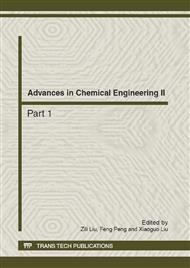[1]
Lu X and Isacsson U: Effect of Aging on Bitumen Chemistry and Rheology. Construction and Building Materials, 2002, 16(1):15-22.
DOI: 10.1016/s0950-0618(01)00033-2
Google Scholar
[2]
Zhi-hui Li, Yi-qiu Tan, Xin-ye Zhou: The Research of the Asphalt Binder High and Low Temperature Properties. Petroleum Asphalt, 2005,19(5): 15-18.
Google Scholar
[3]
Abbas A, Choi C. B, Masad E, et al: The Influence of Laboratory Aging Method on the Rheological Properties of Asphalt Binders. Journal of Testing and Evaluation, 2002,30(2): 171-176.
DOI: 10.1520/jte12304j
Google Scholar
[4]
Qing-hua Zhou, Ai-min Sha: Comparison of high-temperature rheological evaluation indices for bitumen. Journal of Traffic and Transportation Engineering,2008,8(1):27-30.
Google Scholar
[5]
Zhong-niang Feng, Rui-riang Wang, Rong-ji Cao: Study on Asphalt High Temperature Properties by Repeat Creep Test. Journal of China & Foreign Highway, 2007, 27(1):181-183.
Google Scholar
[6]
Hai-jun Li, Xiao-ming Huang, Fan-qi Zeng: Analysis and Evaluation of Aging Behavior of Road Asphalt. Journal of Highway and Transportation Research and Development, 2005, 22(4):7-8.
Google Scholar
[7]
Xiao-yan Song, Yue-zong Du, Ke Zhao: Study on Stabil ity of PolymerModif ied Bitumen by Thermodynamic Method. Petroleum Asphalt, 2004, 18(3):40-45
Google Scholar
[8]
Qi Dai, Yong-gang Ren: Analysis of viscoelasticity parameter of testing asphalt. Technology & Economy in Areas of Communications, 2007, 44(6):22-23
Google Scholar
[9]
Jin-qin Wang, Wen-hua Pu, Ke-hong Yang: Evaluation on the Performances of Karamay Paving Asphalt with the SUPERPAVE Performances Graded Specifications. Petroleum Asphalt, 2006,22(1):61-62
Google Scholar
[10]
Jun-an Shen, Serji Amirkhanian, Boming Tang: Effects of rejuvenator on performance-based properties of rejuvenated asphalt binder and mixtures. Construction and Building Materials, 2006, 21: 958-964.
DOI: 10.1016/j.conbuildmat.2006.03.006
Google Scholar


